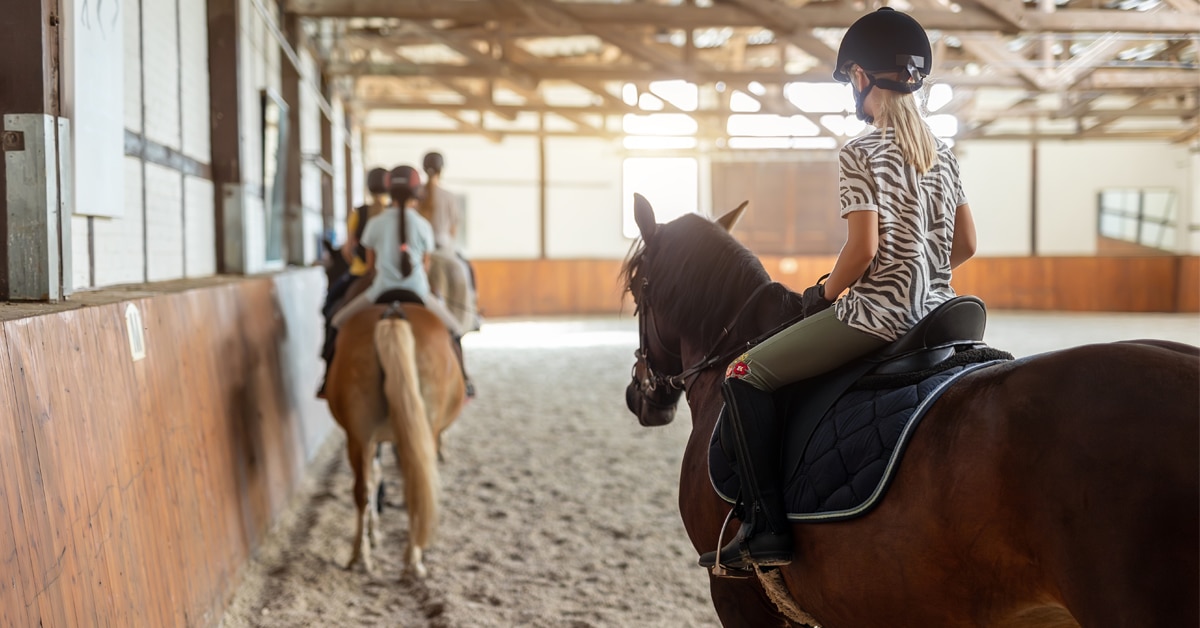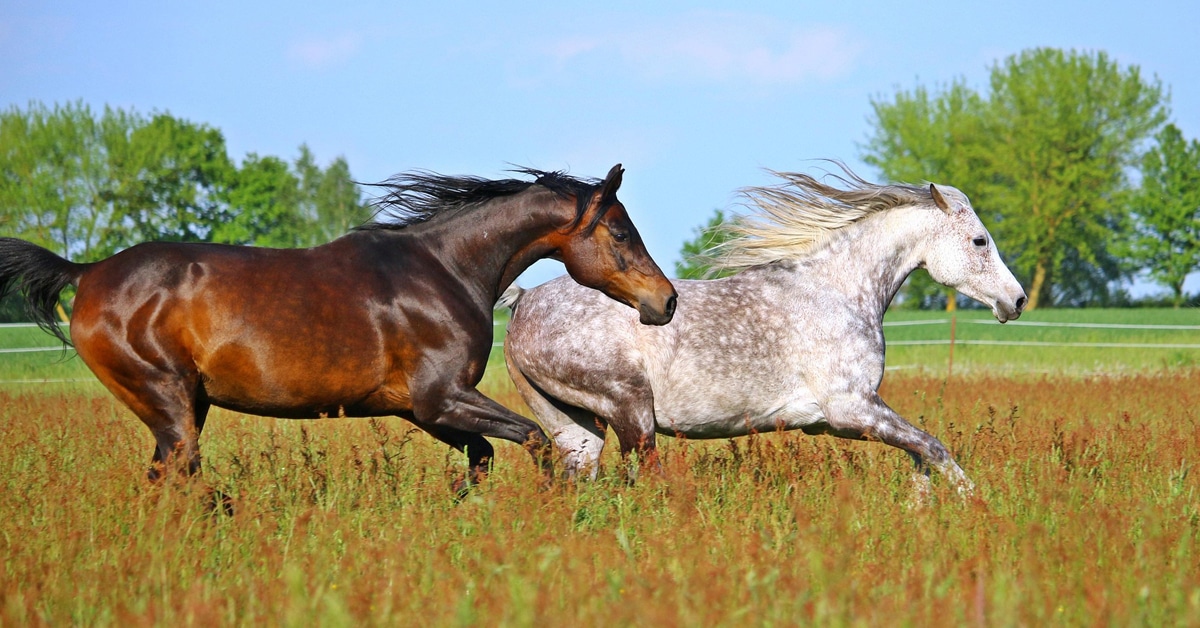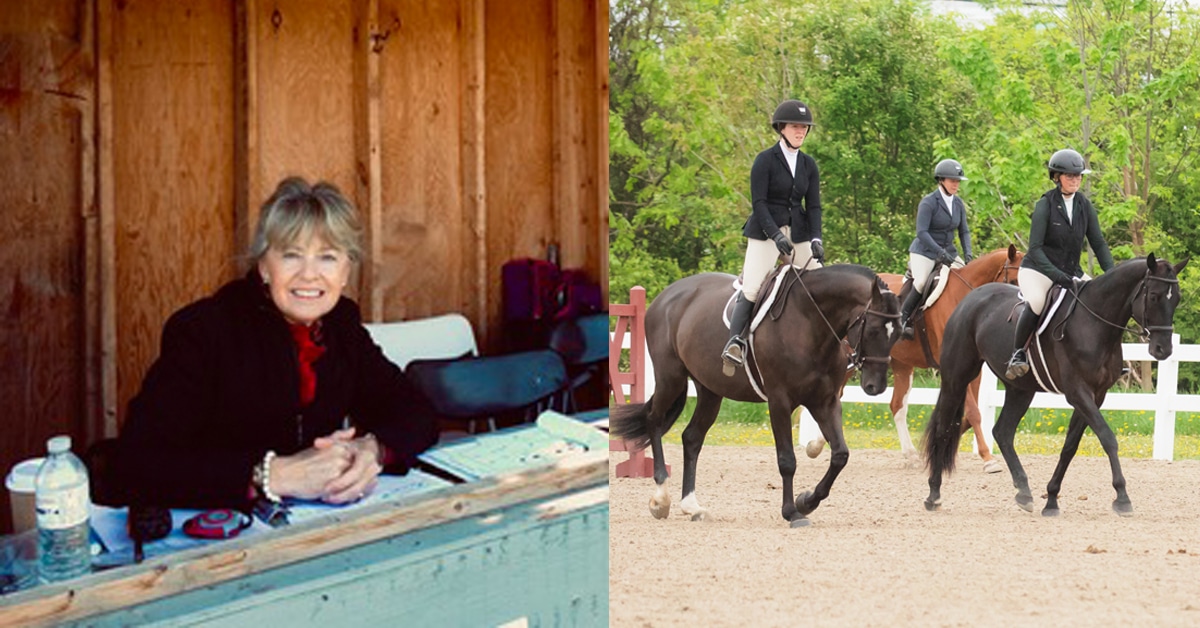What Happens To Bored Horses?
The negative effects of behavioral boredom in horses show up in the symptoms and behavior problems discussed in the previous chapter, including personality issues and training challenges. But long-term inability to behave naturally can also harm your horse’s body. This means that preventing boredom before it causes problems should be a top priority.
How Behavior Loss Creates Chronic Stress
The stress response is how your horse’s body responds to threatening situations. It’s how he reacts when he perceives danger. Stress causes changes in the body that help animals respond to a threat by doing things like running away or fighting off an opponent.
Before horses were domesticated, they experienced natural stress regularly. Running from predators, fighting for breeding rights, or delivering a foal are all stressful events, but they’re a normal and even healthy part of life. The key is that most stress in the wild is acute stress, which resolves quickly. The herd escapes the predator, the fight ends, or the baby is born. When the stressful situation ends, the body’s chemistry and the horse’s behavior go back to normal.
But many horses today live with chronic stress. Your horse’s brain perceives situations like being housed alone or going without food as a threat, but unlike acute stress, these threats may never go away. As a result, the horse’s brain and body don’t return to a normal, non-stressed state. Routines and environments that don’t meet a horse’s mental and physical needs can create chronic stress.

(Left) This plain, functional stall contains only water, a meal of processed feed and a shallow layer of bedding. Many horses spend a large portion of their lives in spaces like this. (Right) Here is an ‘enriched’ stall designed to prevent boredom indoors with (l-r) a sensory board scented with herbs and spices, slow-feeding hay net, scratching post, licking mat and rolling puzzle feeders.
Chronic stress is an unhealthy stress that’s very demanding on the body and brain. This is because the stress response primes animals for action by “turning the dials” on different systems in the body. To keep you safe, your “fight-or-flight” response primes the muscles for fight or flight, but “turns down” the immune system, digestion, ability to think about things that aren’t critical for survival, and more. Have you ever felt exhausted or depressed, or become sick, after being under stress for a long period? If so, you’ve experienced the downstream effects of being under stress for too long.
When your horse’s lifestyle prevents behavior and stimulation—like being stalled for long periods, not having access to forage, or living alone—he experiences chronic stress. Depending on his situation, he may also be under stress from a demanding training schedule, an injury, or travel. Over time, these horses may develop the unhealthy or unwanted coping strategies discussed earlier (p. 38), or suffer the physical problems I’ll cover here. By recognizing the impact of behavioral challenges on the body, you’re better equipped to prevent or resolve the issue.
The Cycle of Boredom, Stress, and Behavior
Boredom, stress, and your horse’s behavior are interlinked. Stressful situations impact how your horse feels and acts. And lowering stress levels— including by reducing behavioral boredom and encouraging natural activities—can create positive changes in behavior.
Not having choices and the opportunity for behavior causes stress, even when caused by something important like veterinarian-prescribed stall rest. It’s important to keep in mind that stress isn’t under your horse’s control, and he can’t simply “switch it off.” And neither your horse nor you can decide what is or isn’t stressful. The brain is in charge of that part.
This means that you can’t train the stress response out of horses. Good training can help expose your horse to acute stressors (like spray bottles or bicycles) in gentle and effective ways so that they aren’t as frightening. But the body’s response to chronic stressors isn’t something that can be trained out. It’s up to us to stop the stress at its root instead.
When the domesticated lifestyle creates chronic stress by preventing your horse’s natural behaviors, the stress itself can change how your horse behaves and acts. Over time, this can generate a vicious cycle where healthy behaviors diminish while stress and boredom increase. It’s a downward spiral of mental and often physical health (below).

The chronic stress cycle.
Thankfully, your actions and changes can reverse this cycle and create a cascade of positive changes instead. When you give your horse an enriched environment that supports natural equine behaviors, stress levels decrease. Gradually, healthy horse behaviors will begin to replace unwanted or harmful ones. Along with attention to health care, diet, and training, this can help reduce or resolve chronic stress and allow the body and brain to return to normal, healthy function. The better the horse feels, the more open he’ll be to building relationships, participating in training, and enjoying life as a horse.
PHYSICAL SIGNS OF STRESS
Ulcers and Gastrointestinal Problems
Horses are famously prone to gastrointestinal diseases and distress, from ulcers to colic. But while your horse’s wild ancestors may have suffered similar problems from time to time, modern life doesn’t do today’s horse any favors.
Grazing is a fundamental equine behavior. Reduced grazing time is a risk factor for equine gastrointestinal ulcer syndrome (EGUS). In this painful condition, stomach acids damage the delicate lining of your horse’s GI tract. Unfortunately, ulcers are common and often related to modern feeding routines that don’t provide sufficient access to forage such as pasture or hay. Horses who can’t graze frequently enough, day and night, have no material in their GI tract to buffer their stomach acid, which then eats away at the insides of the stomach and gut.
Ulcers cause chronic pain that impacts the rest of the horse’s body, which can lead to increased anxiety and bad behavior during handling and training, in addition to weight loss and other physical issues. EGUS is strongly associated with the kind of lifestyle and routines that prevent natural behaviors. It’s more common in horses kept in stalls who eat a large amount of processed feed. By the same token, a lifestyle that promotes healthy horse behaviors like grazing eliminates boredom and tends to guard against EGUS. An enriched, species-appropriate lifestyle is not a guarantee that a horse will never develop this condition, but it makes it less likely.
Ulcers aren’t the only gastrointestinal issue linked to behavioral boredom. We know that a behavior-restricted lifestyle causes stress, and high levels of stress puts a strain on all parts of a horse’s body. Tension and anxiety can put a horse at higher risk of gastrointestinal upsets or affect how well they maintain their weight. Horses without the chance to graze or forage throughout the day may also experience food anxiety, leading to bolting feed and increasing the risk of choke (esophageal obstruction) during meals. As we’ve discussed, they may chew or eat non-food items like fencing wood, dirt, or manure. Food-related resource guarding can cause fighting that leads to injuries.
By contrast, when you reduce overall stress and give horses the opportunity to eat in an equine-appropriate way, with both the right type and schedule of feeding, they can enjoy the benefits of better gastric health. Improved nutrient uptake, healthy manure output, and mental well-being are easier to come by when your horse’s diet meets his physical and psychological needs.
Remember, your veterinarian should be your first point of contact when you suspect that your horse has a gastrointestinal problem, regardless of the cause. After you’ve provided treatment, you can help prevent future problems through good behavioral care.
Body Condition and Muscle Tone
A bored horse is often an inactive horse, and vice versa. Many horses don’t have enough opportunity or motivation for self-directed exercise. Stalls require horses to be inactive because of their small size, and major muscle groups, tendons, and bones all stay still and mostly unused during stall time. Moving frequently as nature intended is better for fitness and flexibility, keeping the horse’s body limber and moving freely. Turnout time is always better than complete confinement in a stall, but solo turnout in a small pen tends to promote inactivity in the same way as stalls: there’s just not much reason to move around.
The solution isn’t simply to add extra riding or longeing. Human-directed exercises can be wonderful for improving a horse’s fitness and athletic skill. They’re also a good way to encourage high-intensity activity for shorter periods. If you give your horse exercise and you both enjoy it, definitely continue to do so! But exercise given in a riding or longeing workout is different from self-directed movement, just like a “PE” class in school isn’t the same as free time outdoors. It’s important for horses to move throughout the day, not just in one short period of activity, and to choose for themselves where to go and what to do.
Giving your horse opportunities for more movement, including turnout in enriched and complex spaces, promotes whole-body fitness. It’s vital for all horses, but especially important for equines who can’t participate in human-led exercise like riding. Owners who move horses into a full-time turnout situation often report positive changes in condition and weight control. Interestingly, it’s not just overweight horses who benefit: many owners have found that their hard-keepers gain weight when given more turnout rather than less.
Skin, Coat, and Hoof Health
Rolling, grooming, and resting are self-maintenance behaviors. They’re the equine version of self-care and keep the body in good condition. But bare or under-stimulating environments often prevent a horse from taking good care of his body.
The kinds of spaces that produce equine boredom also usually don’t encourage much self-care. A featureless stall or pasture makes it hard for horses to take care of their skin by rubbing away itches. Thin bedding over hard stall floors makes lying down for deep sleep uncomfortable, preventing rest and causing sleep deprivation. And time spent in small spaces prevents the movement and blood circulation that helps create strong and healthy hooves.
Additionally, chronic stress can affect animals’ desire for self-care. Stress makes the brain focus on potential threats and inhibits activities that aren’t crucial for escape and survival. Have you noticed that when stress piles up from work, school, or home, you’re less motivated for your own self-care? This can also happen to animals that are stressed or kept in inappropriate environments. An anxious or chronically stressed horse may stop grooming others or himself, feel too unsafe to lie down, and more.
By contrast, when you provide a boredom-busting, enriched lifestyle, you’ll help your horse occupy his time and improve his overall condition. Objects like scratching posts and sand wallows make your horse more comfortable, reduce insect irritation, and promote healthy, glowing coats. An enriched stall or shelter with friends nearby encourages rest and prevents sleep deprivation. Providing more turnout and different ground textures can improve hoof health.
RELATIONSHIPS
Your horse’s struggles don’t only affect him. As we touched on in the previous chapter, horses with behavior challenges or unwanted habits resulting from behavioral boredom can be hard to live with. Both stablemates and humans find it challenging to manage life with a horse whose behavioral needs aren’t being met. For everyone’s sanity, providing stimulation and a horse-appropriate lifestyle is a must.
Equine Relationships
Poor management can negatively impact your horse’s social life. And since horses are herd animals, their social life is extremely important to their well-being. Bored or behaviorally impoverished horses can be less emotionally stable than their herdmates and struggle to integrate into a herd setting. They may not tolerate changes in herd structure, struggle to develop bonds with other horses, or show aggression or fear. Understandably, other horses might not have patience for their behavior, and the less emotionally stable horses can end up victimized and bullied.
Restricting social interaction when a horse is young can set a horse up for long-term struggles. Orphaned foals raised by humans instead of mares have a reputation for growing into socially challenged adults. Isolating young horses, such as keeping foals or weanlings full-time in individual stalls, causes stress while preventing social interaction. In the long term, it can prevent young horses from learning the “social language” of the herd, including how to interact with horses of different ages and sexes.
Unfortunately, we often “manage” these social troubles by giving the struggling horse less time with other horses. Owners and barn managers usually turn to single paddocks or turnout time in a controlled space like an arena, without other horses, to keep the other equines safe from injury or stress. This is a practical and realistic choice, but one with profound implications for socially challenged horses’ ability to behave and socialize naturally.
Repairing herd relationships and establishing safe, healthy bonds with other horses is one of the most challenging, but most important, elements of relieving boredom.
Human Relationships
The behavior-challenged horse also can have trouble interacting with people safely and effectively. If you’ve experienced any of the behavior and personality issues discussed in chapter 2 (see p. 22), you’re well aware of how tough it can be to maintain a strong, trusting relationship in the face of bad habits. It’s understandable for you, barn staff, and others to get frustrated by a horse who is destructive or challenging to handle.
But frustration and hurt feelings can go both ways. Your horse sees you or other humans as the source of things they enjoy or need in order to survive, like access to the outdoors or food. Horses with tightly managed lifestyles and little choice or control become extremely dependent on humans to meet their needs. And if they don’t feel those needs are being met—say, when you pass by an unfed horse with a bucket of grain—they may have big feelings about it. Frustration and resentment can stain your horse’s opinion of you and his other handlers.
Taking the time and effort to engage your horse in natural behaviors is well worth some small changes in your setup and routine. Not only does it offer positive benefits for your horse’s body and mind, it makes him a better friend to his stablemates and more pleasant for people to be around.
***
Order your copy of No Bored Horses: Essential Enrichment for Happy Equines from Trafalgar Square Books HERE.
The Latest











